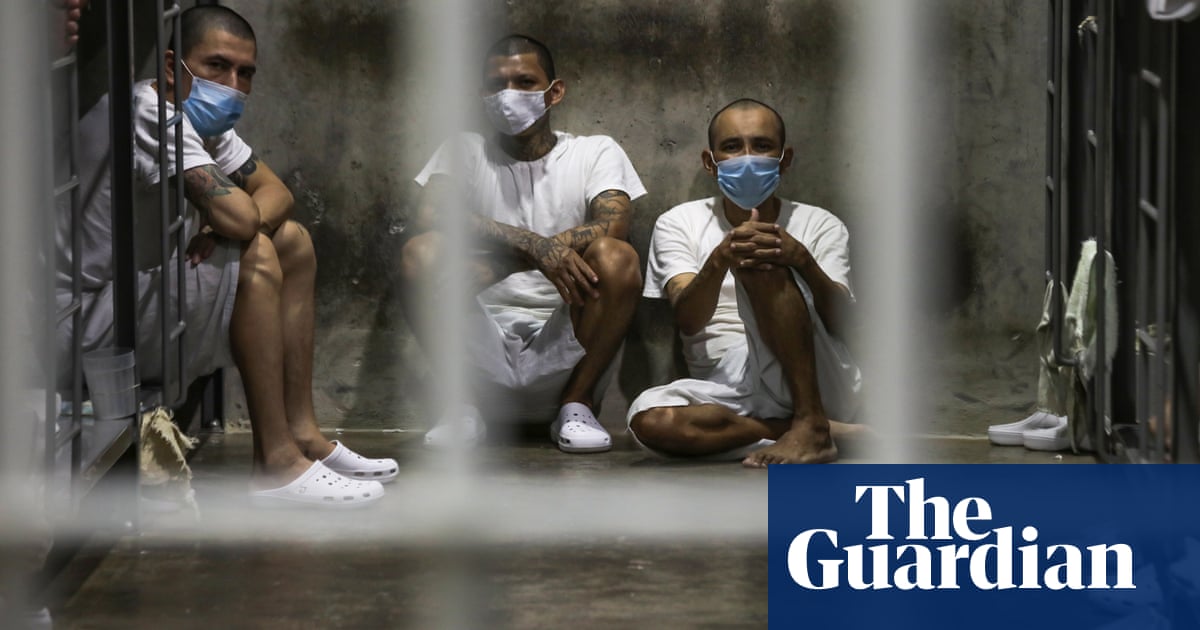Lawyers for252 Venezuelans deportedby the Trump administration and imprisoned inEl Salvadorfor two months have alleged that the migrants are victims of physical and emotional “torture”.
A law firm hired by the Venezuelan government said that it had been unable to visit the migrants inthe mega-prison where they are locked up.
The lawyers are seeking “proof of life”, but say they have come up against a wall of silence from President Nayib Bukele’s administration and the Central American nation’s justice system.
Grupo Ortega filed a habeas corpus petition with the supreme court on 24 March seeking an end to what it calls the “illegal detention” of the Venezuelans, but is still waiting for a ruling.
“They are treating them like common criminals,” lawyer Salvador Ríos said, after the migrants were shown dressed in prison clothing, shackled and with shaved heads.
“This is torture,” both physically and psychologically, Rios said in an interview with AFP.
The lawyers delivered a letter in early May to Bukele, a key ally ofDonald Trump, requesting authorization to visit the Venezuelans, but so far without success.
AFP sought a comment from the Salvadorian presidency about the case and the lawyers’ efforts, but has not received a response.
Félix Ulloa, the Salvadorian vice-president, told the French media outlet Le Grand Continent that his government merely provides a “service that we could call prison accommodation”.
Trump’s administration has paid Bukele’s government millions of dollars to lock up migrants it says are criminals and gang members.
Trump invokedrarely used wartime legislationin March to fly migrants to El Salvador without any court hearing, alleging they belonged to theTren de Araguagang, a charge that their families and lawyers deny.
The Venezuelans, as well as 36 deported Salvadorian migrants, are being held in a maximum-security prison built by Bukele to house thousands of suspects arrested during his sweeping crackdown on street gangs.
Images of the Venezuelans entering the Cecot mega-prison in shackles illustrate the brutality, Ríos said.
“The damage is not only physical, but also psychological,” Ríos said.
In their letter to Bukele, the lawyers sought permission to interview the prisoners, either in person or virtually, which could serve as “proof of life”.
They asked Bukele to release the list of the 252 Venezuelans, something that Washington has not done either.
One Salvadorian migrant who was initially incarcerated in Cecot – but in April was moved to a prison farm – isKilmar Ábrego García, a US resident deported due to what the United States itself admitted was an administrative error.
A Venezuelan identified in US court documents as “Cristian” was also mistakenly expelled.
In both cases, US judges unsuccessfully ordered theTrump administrationto facilitate their return to the United States.
Volker Türk, the UN human rights chief, said this week that the situation “raises serious concerns regarding a wide array of rights that are fundamental to both US and international law”.
“Families we have spoken to have expressed a sense of complete powerlessness in the face of what has happened and their pain at seeing their relatives labelled and handled as violent criminals, even terrorists, without any court judgment as to validity of what is claimed against them,” he said in a statement.
Isael Guerrero, another lawyer with Grupo Ortega, described the detentions as “completely illegal” because the Venezuelans “are not being legally prosecuted in any court” inEl Salvador.
The firm’s head, Jaime Ortega, said they were “100% migrants”.
“Not a single one of them is being prosecuted” in the United States for their alleged membership of the Tren de Aragua gang, he said.
The fate of the Venezuelans now depends entirely on Bukele, as “the expulsion completely nullifies US jurisdiction”, Ortega said.
In April, Bukele offered to trade the 252 Venezuelans for an equal number of political prisoners held by President Nicolás Maduro’s government.
